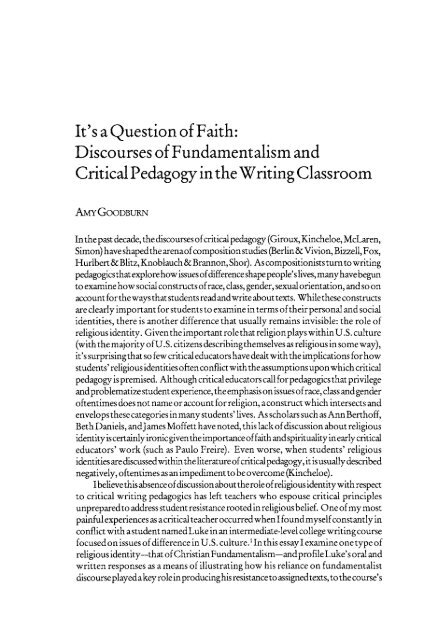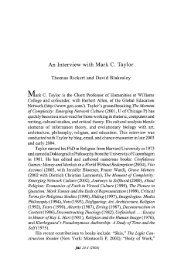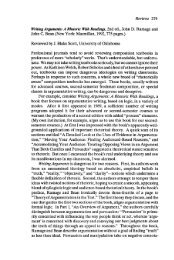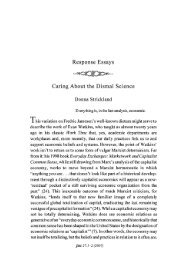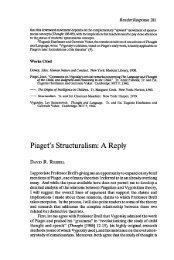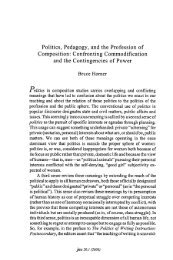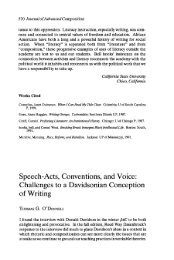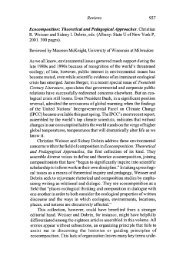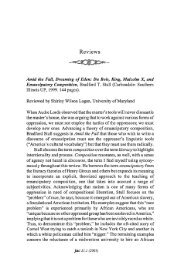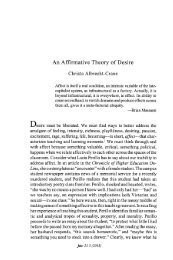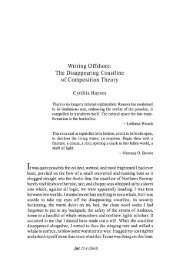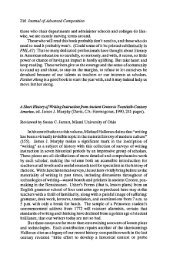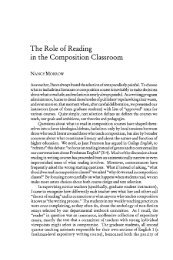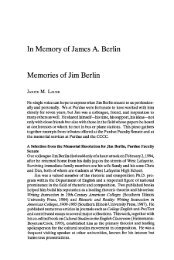It's aQuestion ofFaith: Discourses of Fundamentalism ... - JAC Online
It's aQuestion ofFaith: Discourses of Fundamentalism ... - JAC Online
It's aQuestion ofFaith: Discourses of Fundamentalism ... - JAC Online
Create successful ePaper yourself
Turn your PDF publications into a flip-book with our unique Google optimized e-Paper software.
<strong>It's</strong> a Question <strong>of</strong> Faith:<br />
<strong>Discourses</strong> <strong>of</strong> <strong>Fundamentalism</strong> and<br />
Critical Pedagogy in the Writing Classroom<br />
AMYGOODBURN<br />
In the pastdecade,the discourses<strong>of</strong>criticalpedagogy(Giroux,Kincheloe,McLaren,<br />
Simon)haveshapedthe arena<strong>of</strong>compositionstudies(Berlin& Vivion,Bizzell,Fox,<br />
Hurlbert & Blitz,Knoblauch& Brannon,Shor).Ascompositioniststurn to writing<br />
pedagogicsthat explorehowissues<strong>of</strong>differenceshapepeople'slives,manyhavebegun<br />
to examinehow socialconstructs<strong>of</strong>race,class,gender,sexualorientation, andsoon<br />
accountforthewaysthat studentsreadandwrite abouttexts.Whiletheseconstructs<br />
areclearlyimportant for students to examinein terms <strong>of</strong>their personal and social<br />
identities, there is another differencethat usually remains invisible: the role <strong>of</strong><br />
religiousidentity. Giventhe important rolethat religionplayswithin U.s.culture<br />
(withthe majority <strong>of</strong>U .5.citizensdescribingthemselvesasreligiousinsomeway),<br />
it's surprisingthat s<strong>of</strong>ewcriticaleducatorshavedealtwith the implicationsfor how<br />
students' religiousidentities<strong>of</strong>tenconflictwith the assumptionsupon which critical<br />
pedagogyispremised. Although criticaleducatorscallfor pedagogicsthat privilege<br />
andproblematizestudentexperience,theemphasison issues<strong>of</strong>race,classandgender<br />
<strong>of</strong>tentimes doesnot nameor accountfor religion,aconstruct which intersectsand<br />
envelopsthesecategoriesinmany students' lives.AsscholarssuchasAnn Berth<strong>of</strong>f,<br />
BethDaniels,andJamesM<strong>of</strong>fett havenoted, this lack<strong>of</strong>discussionabout religious<br />
identityiscertainlyironicgiventheimportance<strong>of</strong>faithandspiritualityinearlycritical<br />
educators' work (such asPaulo Freire). Even worse, when students' religious<br />
identitiesarediscussedwithin theliterature<strong>of</strong>criticalpedagogy,itisusuallydescribed<br />
negatively,<strong>of</strong>tentimesasanimpedimentto beovercome(Kincheloe).<br />
I believethisabsence<strong>of</strong>discussionabouttherole<strong>of</strong>religiousidentitywith respect<br />
to critical writing pedagogics has left teachers who espouse critical principles<br />
unprepared to addressstudent resistancerooted inreligiousbelief.One <strong>of</strong>my most<br />
painfulexperiencesasacriticalteacheroccurredwhen I found myselfconstantly in<br />
conflictwith astudent namedLuke inan intermediate-levelcollegewriting course<br />
focusedon issues<strong>of</strong> differencein U .5.culture. 1 In this essayI examineone type <strong>of</strong><br />
religiousidentity-that <strong>of</strong>Christian<strong>Fundamentalism</strong>-and pr<strong>of</strong>ileLuke's oraland<br />
written responses as a means <strong>of</strong> illustrating how his reliance on fundamentalist<br />
discourseplayedakeyroleinproducinghisresistanceto assignedtexts,to thecourse's
334<strong>JAC</strong><br />
statedgoals,andto my authority astheteacher.Itwasonlythrough examiningLuke's<br />
responses in terms <strong>of</strong> fundamentalistdiscourse that I began to understand and<br />
appreciatehispositioninmy classroomand,further,waschallengedtoquestionsome<br />
<strong>of</strong>the assumptions undergirding the discourses<strong>of</strong>criticalpedagogyinwhich I had<br />
placed so much faith. Basedon my experiences,I suggestthat Luke's responses<br />
foreground two problems with the absence<strong>of</strong> discussion regarding the role <strong>of</strong><br />
fundamentalistdiscoursewith respectto criticalwritingpedagogics.First,ithasleft<br />
teachersrelativelyunpreparedforstudentswho resistreadingandwritingaboutissues<br />
<strong>of</strong>differencedueto fundamentalistbeliefs.Teacherswho areunaware<strong>of</strong>thepossible<br />
influences<strong>of</strong>fundamentalistbeliefson studentwritingandreadingcan<strong>of</strong>tenmisread<br />
their students' responses. Secondly,it hasallowedcriticaleducatorsto overlook a<br />
common threadbetweenthediscourses<strong>of</strong>criticalpedagogyandfundamentalism:the<br />
language<strong>of</strong> socialcritique. By ignoring the similar roles <strong>of</strong> socialcritique in the<br />
discourses<strong>of</strong>both fundamentalistsandcriticaleducators,criticaleducators<strong>of</strong>tenmiss<br />
opportunitiesto findareas<strong>of</strong>commongroundwith fundamentaliststudentsandleave<br />
their own assumptions about the methods and goals <strong>of</strong> critical pedagogy<br />
uninterrogated- indecidedlyuncriticalways.<br />
Myinterestinexploringtheconnectionsbetweendiscourses<strong>of</strong>fundamentalism<br />
andcriticalpedagogycameabout quiteby accident,whileIwasconductingresearch<br />
for my dissertation at alargestate university in three sections <strong>of</strong> English 300-an<br />
intermediatecollegelevelwritingclassfocusedaroundissues<strong>of</strong>differencewithinU.S.<br />
culture.' InitiallyIsoughtto examinehow studentsandteachersnegotiateauthority<br />
within writing coursesfocusedon issues<strong>of</strong>difference.Although Iwasateacherwho<br />
supported criticalwritingpedagogies,Icameto this projectbelievingthat students'<br />
voiceswereabsentfromthe literatureon criticalpedagogy,andI wantedmy research<br />
to focuson students' descriptions and understandings <strong>of</strong>their experienceswithin<br />
courses based around critical pedagogicalprinciples. I chose English 300: "The<br />
AmericanExperience"becauseitfulfilledthisuniversity'sdiversityrequirementby<br />
askingstudentsto readandwriteaboutnonfictiontextsinterms<strong>of</strong>race,class,gender,<br />
and other socialdifferences. During the term I studied one <strong>of</strong> my own classesasa<br />
teacher researcher and two other English 300courses asa participant observer,<br />
selectingsectionstaught by teacherswho alsoespousedcriticalpedagogicalgoals.In<br />
addition, I hired an undergraduate, Mindy, to be a participant observer in my<br />
classroom and to interview my students twice throughout the term about their<br />
expenences.<br />
At the term's end, I assessedmy attempts to be a"critical"teacher asafailure.<br />
Evenbeforethe term began,I knewthat studentswere<strong>of</strong>tentimesresistantto taking<br />
English 300 because <strong>of</strong> its diversity focus. Students <strong>of</strong>ten describe this classas<br />
"politicallycorrect" and saythat they needto adopt the politics<strong>of</strong>the instructor in<br />
order to pass. Asone student told the participant observerin my class,"One <strong>of</strong> my<br />
friends,when hetook thisclass,hejustfakedeverythingthat hewrote about. He just<br />
liedabout everything" (Mindy'sJournal 1-14-93).BecauseIhad taught this course<br />
severaltimes,I wasprepared for students who didn't liketo discussor write about<br />
issuesconnectedto racismor sexismor homophobia. But nothing prepared mefor
<strong>Discourses</strong><strong>of</strong> Fundementalism 335<br />
the way that students inthis particular classresponded. Asthe term progressed, a<br />
block <strong>of</strong> seven students (out <strong>of</strong> 18)who identified themselves as "Conservative<br />
Christians" started to make their resistancevisibleandvocal:they sattogether in a<br />
cluster <strong>of</strong>two tables,they dominated classdiscussions,andsome<strong>of</strong>them refusedto<br />
readorwrite about assignedtexts. Asateacher,Iwasfrustrated by my inability to<br />
connect with these students, andI wasangrywith the waysthat they treated other<br />
students in the class. As aresearcher, though, I was intrigued by these students'<br />
responses to classdiscussionsand assignedreadings, particularly in terms <strong>of</strong> the<br />
grounds<strong>of</strong>authority upon whichthey assertedthemselves.At semester'send,both<br />
Mindy andIdiscussedthewaysthat religiousdifferenceseemedto playanimportant<br />
part in how the students had responded to the course assignments and to me.' In<br />
attemptingto writeaboutthiscourseformy dissertation,then, Ibeganto explorethe<br />
literature<strong>of</strong>fundamentalismandtoconsidermorefullywhy fundamentalistdiscourse<br />
seemed to be more powerful and attractive for many <strong>of</strong> the students than the<br />
discourses<strong>of</strong> criticalpedagogythat I had initially hoped to enact.'<br />
My own consciousnessregardingtheterm "fundamentalist"emergedinconcert<br />
with the 1994politicalelectionandpublicdiscourseabout the risinginfluence<strong>of</strong>the<br />
"ReligiousRight" inAmericansociety.Popular newsmagazinessuchasNewsweek<br />
and Timeandtelevisionshowssuchas48Hourshaveallpr<strong>of</strong>iled,invaryingdegrees,<br />
the rise<strong>of</strong>"fundamentalism"withinU.S.culture.Within academiccircles,MartinE.<br />
Marty andR. ScottAppleby's FundamentalistProject-a multi-million dollar,sixyear,six-volumestudycomparingfundamentalismsaroundtheworld<br />
supportedby<br />
the American Academy<strong>of</strong>Arts andSciences-reflects how scholarshavebegun to<br />
attendto fundamentalistbeliefasameans<strong>of</strong>interpretingsocialandpoliticalbehavior.<br />
Whileaslateasthe 1960smostfundamentalistseschewedpoliticalactionassecondary<br />
to the goals<strong>of</strong>missionaryconversion,recentlyfundamentalistdiscourse-through<br />
the politicalpower <strong>of</strong>the ChristianCoalition andthe conservativethink tankswith<br />
which it isallied-has shapedthe U .5.culturalandpoliticalscene.And whileschool<br />
curriculum hashistoricallybeenasite<strong>of</strong>contest overdifferentreligiousbeliefsand<br />
values,increasingly,fundamentalistshavenamedschoolsasaprimarysiteforpolitical<br />
action. Indeed, debates about the role <strong>of</strong> religiousbeliefin public education have<br />
becomealmostmainstream,with proposedconstitutionalamendmentsto legitimize<br />
groupprayerintheclassroom,callsforvouchersto fundstudentenrollmentinprivate<br />
Christian schools,andcurrent lawsuitsinstatessuchasAlabamato allowChristian<br />
religiousactivities,suchasBiblereadingandthe posting<strong>of</strong>the ten commandments,<br />
within K-12publicschools(Kaniiner).<strong>It's</strong> not surprising,then, that students' texts<br />
andresponsesreflectandproducethislargerculturaldiscourse.But giventhat many<br />
<strong>of</strong>theseactivitiesaresupportedby Christiansandotherswho donot namethemselves<br />
asfundamentalist, usingthe term "fundamentalist" asameans <strong>of</strong> understanding<br />
behavioriscomplicated.<br />
In its historical sense Christian fundamentalism describes "a coalition <strong>of</strong><br />
conservative, predominantly Calvinist, Protestants that emerged from within a<br />
broader, more ecumenicalevangelicalculture inthe latenineteenth century" based<br />
on the fivefundamentals <strong>of</strong> faith (Bendroth 4). Basedon the 1895Niagara Bible
336]AC<br />
Conference, the fivefundamentals <strong>of</strong>faith, which separatehereticsfrom believers,<br />
include 1)the virgin birth <strong>of</strong>Christ, 2)substitutionary atonement (Christ's death as<br />
payment for human sin),3)the bodily resurrection <strong>of</strong> Christ and the supernatural<br />
reality <strong>of</strong> miracles,4)inerrant Scripture (without factualor scientificerror) and 5)<br />
dispensational premillenialism (theliteralSecondComing <strong>of</strong> Christ) (Bendroth 5).<br />
But this historical definition iscomplicated by the fact that the term "Christian<br />
fundamentalist"within U.S.culture <strong>of</strong>tenconjuresimages<strong>of</strong>peoplewith narrow or<br />
extreme attitudes. And in itscontemporary sensethe term "fundamentalist"isused<br />
more broadly to includegroups<strong>of</strong>peopleforwhom religiousbeliefconstitutesanallencompassing<br />
personal and socialidentity and who perceivethis identity asbeing<br />
threatened by secularsocialforces. AsMarty and Appleby suggest,this notion <strong>of</strong><br />
perceivedthreat isessentialfor understanding fundamentalist responses:<br />
Feeling this identity to be at risk in the contemporary era, they [fundamentalists] fortify it by<br />
a selective retrieval <strong>of</strong> doctrines, beliefs, and practices from a sacred past ... to serve as a<br />
bulwark against the encroachment <strong>of</strong> outsiders who threaten to draw the believers into a<br />
syncretistic, areligious, or irreligious cultural milieu. (3)<br />
In defining Christian fundamentalist discourse within this essay,then, I am not<br />
referring to adescription <strong>of</strong> practices0 r institutio nalaffiliations,but rather to aset<br />
<strong>of</strong>guidingassumptions,whatKathleenBoonedescribesinTheBibleTells1bemSo:The<br />
Discourse<strong>of</strong>Protestant<strong>Fundamentalism</strong>as"atendency, ahabit <strong>of</strong>mind, rather than a<br />
discretemovement or phenomenon, ...abody <strong>of</strong>discoursearisingfrom beliefinthe<br />
sole authority <strong>of</strong> an inerrant Bible" (10)and what Joseph Kincheloe names as"an<br />
absolutistview<strong>of</strong>religiousauthority, theliteralnature<strong>of</strong>theBibleasaninfallibletext,<br />
andthe centrality <strong>of</strong>aconversionexperienceon the road to the salvation<strong>of</strong>the soul"<br />
(50).In my class,the seven students who described themselves as"Conservative<br />
Christians"belongedto severaldifferentchurchesanddenominations,but alldefined<br />
themselvesasholding "true" Christian beliefsthat were more authentic than those<br />
<strong>of</strong>other students and feltthat they werethe only oneswho were "saved."Regardless<br />
<strong>of</strong> whether students named their beliefsasfundamentalist or not, their discourses<br />
seemed powerfully shaped by these common tendencies or habits <strong>of</strong> mind. As<br />
Bendroth suggests,the discourse<strong>of</strong>fundamentalismhasbecomeincreasinglyprominent<br />
because<strong>of</strong>"[i]ts powerful language<strong>of</strong>alienationanditscritique <strong>of</strong>moral laxity<br />
in the wider culture" (5).It isthis powerful language<strong>of</strong>critiquethat I wishto explore<br />
further by pr<strong>of</strong>iling the writing <strong>of</strong> Luke, the student who seemedto bethe most<br />
resistant in my English 300course.<br />
Luke: A Case Study<br />
A 19-year-oldsophomore majoring in English, Luke was amember <strong>of</strong> the men's<br />
gymnastic team and a Christian Fellowship Bible group on campus. Without<br />
question, one <strong>of</strong>the most important issueson Luke's mind washisfaith. Describing<br />
himself asan Episcopalian Christian in astudent survey, Luke's religiouscommitments<br />
surfacedin the classin many ways. During classdiscussionsabout readingson<br />
multicultural issues,he <strong>of</strong>ten pulled aNew Testament from his backpack to cite
<strong>Discourses</strong><strong>of</strong> Fundementalism 337<br />
biblical authorities whom he feltwere relevant to the topic at hand. His papers also<br />
reflected his interest in writing about and sharing his religious beliefs:for the first<br />
assignment,which askedstudentsto tracethehistory<strong>of</strong>one<strong>of</strong>theirbeliefs,Lukewrote<br />
anarrative describinghisconversionexperienceandhissubsequentviews<strong>of</strong>lifeafter<br />
death. Several<strong>of</strong>hisinformalresponsepapersto assignedreadingssharedhisreligious<br />
beliefsaswell, usually in opposition to what he considered the secular and controversialissuesin<br />
the texts. Almost all<strong>of</strong> Luke' soral and written responses reflected<br />
afundamentalist discoursethat motivated hisresistanceto classassignmentsandthe<br />
overall goals<strong>of</strong> the course throughout the term.<br />
From the firstday,Luke madeitclearthat hewasopposedto readingandwriting<br />
about issues<strong>of</strong>diversity. In addition to marking "disagree"to asurvey <strong>of</strong> statements<br />
such as"1believe issues<strong>of</strong> diversity should be addressedin university courses" and<br />
"1enjoy classesthat deal with issues <strong>of</strong> diversity," Luke hinted at his religious<br />
convictions in writing about hisinitialattitude to the class:"my attitude toward this<br />
classis1hope the material isdiscussed in an unbiased manner and not assumed to<br />
be correct, such asthe theory <strong>of</strong> evolution" (Survey 1-5-93).Usingthe theory <strong>of</strong><br />
evolution asanexample<strong>of</strong>how curricularknowledgecontradietshisreligiousbeliefs,<br />
Luke suggeststhat being"unbiased"meansacknowledginghisreligiousconvictions<br />
asequally valid in relation to other views. Given that evolution isone <strong>of</strong> the most<br />
contestedand highlydebatedissues<strong>of</strong>schoolcurriculum for fundamentalists,Luke's<br />
comments, inretrospect, arenot that surprising. Still,asateacher,1didn't realizethat<br />
Luke's comment foreshadowedthe strugglesover "secular"knowledgeand religious<br />
beliefthat were to motivate his resistancethroughout the term.<br />
One <strong>of</strong>the most visiblesites<strong>of</strong>Luke' sappealsto religiousauthority canbe seen<br />
in his response papers to assigned readings. To illustrate the ways that Luke's<br />
responseswere shapedby hisreligiousdiscourse,I present two <strong>of</strong>hisresponsepapers<br />
which illustrate hisnegotiations with the texts and my goalsasateacher in assigning<br />
them.<br />
Biblical Authority and Revisionist Reading<br />
Luke's firstresponsepaper waswritten in responseto Kristine Beatty's poem "Lot's<br />
Wife." This poem <strong>of</strong>fersarevisionist reading<strong>of</strong>the biblicalstory <strong>of</strong> Lot's wife, who<br />
turned into a pillar <strong>of</strong> salt after looking back at the judgment <strong>of</strong> Sodom and<br />
Gomorrah.' The narrator <strong>of</strong>the poem describesthe dailyduties<strong>of</strong>Lot's wife-baking<br />
bread, raisingchildren, and tending to sickneighbors-as 0 pposed to her husband,<br />
who spendshis lifein contemplation with God (whileLot "struggleswith the Lord<br />
...shestruggleswith the housework"). The narrator suggeststhat Lot's wifedoesnot<br />
"regret the sacrifice" <strong>of</strong> turning into stone because her definition <strong>of</strong> sacrifice is<br />
dependent on relationswith her community rather than with God. Studentsreadthis<br />
poem in conjunction with two other essaysabout the limitingnature <strong>of</strong>genderroles.<br />
This poem seemedespeciallyappropriate forthe unit, 1thought, becauseit<strong>of</strong>fers<br />
arevisionistreading<strong>of</strong>how men andwomen' sworkhas beentraditionally valuedand<br />
it suggestspossibleconsequencesin making such judgments. 1envisioned students<br />
engaging in an intertextual conversation among the two essays and this poem,
338]AC<br />
critiquingor comparingthe "theories"<strong>of</strong>feredabout genderrolesinthe essayswith<br />
the narrative examplein the poem. Preparedfor the possibilitythat somestudents<br />
might not know the biblical story <strong>of</strong> Lot and therefore have no context for<br />
understandingthe poem, I gavethem abriefplot summarybeforehandandreferred<br />
them to the biblicalcitation. What I wasnot preparedfor, however,wasthe hostile<br />
reception that the poem receivedby studentswho werethe most familiarwith the<br />
story. Luke's responsepaper wasrepresentative<strong>of</strong>this group. Presentedhere inits<br />
entirety,Luke'spaperfocusessolelyonthepoem,separatefromtheothertwo assigned<br />
essays:<br />
Responseto "Lot's Wife"<br />
"On the breast <strong>of</strong> the hill, shechoosesto be human, and turns, in farewell-and never<br />
regretsthe sacrifice.U<br />
This poem by Kristine Batey (sic)is really kind <strong>of</strong> naive when consideredby an Old<br />
Testamentstandpoint. How canshesaythat Lot'swife"neverregets(sic)the sacrifice"?The<br />
woman wasturned into apillar<strong>of</strong>salt. Allthrough the poem,the author makesitsound like<br />
God issomealo<strong>of</strong>charaeterthatcanpronouncejudgement(sic)onsomeoneatanytime. God,<br />
inthe Old Testament,wasafriendto Lot's familyandto anyone who calledon hisname. It<br />
wasGod who sentthetwo angelsto warnLot andhisfamilyaboutthe impendingjudgement<br />
on SodomandGomorrah. It wasnot somealo<strong>of</strong>God that remainedquietwhilehisdisciple<br />
waskilled.<br />
The poem takes an event that happened thousands <strong>of</strong> years ago and tries to give it<br />
twentieth century logicandunderstanding.Backinthistime,there wasno placeforawifeto<br />
questionherhusbandorto disobeyhimin anyway. Thispoemtakesastandpointthat isvery<br />
sympatheticto Lot's wife. The factstillremainsthat shewaswarned not to look backafter<br />
fleeingthe judgement<strong>of</strong> God. Shelooked backandpaid the consequencefor her action. I<br />
personallydonot believethat shelookedbackout <strong>of</strong>curiosityto seethejudgement<strong>of</strong>Sodom<br />
andGomorrah. Shedidnot obeythecommand<strong>of</strong>God givenbythe angelsandpaidthe cost.<br />
Thispoem istrying to look attheeventthrough the eyes<strong>of</strong>atwentieth century woman not a<br />
woman who livedthousands <strong>of</strong>yearsago.<br />
Furthermore Lot's wifehad been livingwith him for years and wasfamiliarwith the<br />
workings <strong>of</strong>God. Shemay havedoneallthe thingsthe poemdescribes,shemayhavesaidall<br />
the goodbyes.but they aretrivialthings when comparedto the plans<strong>of</strong>God. In the closing<br />
lines<strong>of</strong>the poem,the author makesLot'swife'sactionsoutto be"good."Obviouslythey were<br />
not goodbecausethey went againstwhat God hadtold them to dowhichwasnot look back.<br />
Yau cannot justifylookingbackandthereforebreakingGod's commandby nostalgia.<br />
Clearly this poem triggered apowerful responseinLuke. While I had envisioned<br />
studentswouldcritiquethepoem,I thoughttheywoulddosoonthebasis<strong>of</strong>theother<br />
two essaysandthediscussionswehadthroughout theterm. ButLuke'sreadingmakes<br />
no mention <strong>of</strong> other texts or discussionsabout socially-constructedgenderroles.<br />
Instead, Luke relieson his own authority asaBiblicalscholar to read-and resist<br />
reading-the poem in waysthat I had not envisioned.<br />
Upon first readingLuke's response,I immediately wasstruck by the way he<br />
differentiatesbetweenthe pastandthe present. AsMarty andAppleby note, one<strong>of</strong><br />
the tenets <strong>of</strong> fundamentalist discourseisareachingback to the past, either realor<br />
imagined,<strong>of</strong>originalconditionsandselectingor retrievingfundamentaltruths from<br />
that pastinorder to thwart the changingpresent (3).One <strong>of</strong>Luke's maincriticisms<br />
isthat the story <strong>of</strong>Lot's wifeisbeingread"through the eyes<strong>of</strong> atwentieth century
<strong>Discourses</strong><strong>of</strong> Fundementalism 339<br />
woman not a woman who lived thousands <strong>of</strong> years ago." This emphasis on<br />
distinguishing between past/present isalsoreflected in the phrases "Old Testament<br />
stand point, ""twentieth century logicand understanding," and "Back in this time."<br />
Arguing that the tale can only be understood within the context it waswritten, Luke<br />
callsany other reading naive.<br />
Luke's resistance to arevisionist reading <strong>of</strong> this biblical story isunderstandable<br />
given how he views the authority <strong>of</strong> biblical text asthe literal and unmediated word<br />
<strong>of</strong> God, an authority <strong>of</strong> meaning that must remain stable and unified across time to<br />
ensure that all readers can accessthe same moral creeds. Rather than retrieving this<br />
moral from the story <strong>of</strong>Lot, Luke argues,the poem (and,by implication, the narrator)<br />
"takes a standpoint that isvery sympathetic to Lot's wife." It isthis standpoint-a<br />
situated reading from a "modern" perspective-that Luke cannot accept. Using<br />
phrases that reflectLuke's attempt to convey an "objective" perspective-"the fact still<br />
remains" and "Obviously"-Luke suggests that those who "impose" twentieth<br />
century logicarenaive. His statement "You cannot justify looking back and therefore<br />
breaking God's command by nostalgia" refersnot only to this specificpoem but also<br />
to Luke's overall philosophy <strong>of</strong>how biblicaltexts canbe read. Readingtextsthrough<br />
a revisionist lens is dangerous, Luke suggests, becausesuch readings are used to<br />
"justify" actions that conflict with God's will. If the Bible's textual authority is<br />
destabilized, God's authority isequally open to interpretation-and revision.<br />
Given Luke's perspectiveon the authority <strong>of</strong>meaning within biblicaltext, it's not<br />
surprising that he does not mention the other two articles that were assignedon this<br />
day. What I first attributed to possible laziness on his part (perhaps he hadn't read<br />
them or just didn't feel like taking the time to write about them) could also be<br />
attributed to the fact that, for him, the Bible is the sole source <strong>of</strong> authority for<br />
interpreting allother texts. Incorporating ideasfrom the articlesto interpret the poem<br />
would have led him to the same downfall asthe narrator <strong>of</strong> the poem, atwentieth<br />
century "stand point" that might have justified readings contradictory to God's<br />
intentions. Luke might have used biblical authority to critique the "secular" essays,<br />
but he chose instead to focus on the objectionable reading that the narrator <strong>of</strong>fers.<br />
Although Luke 0 bviously does take an interpretive stance to the poem, he views<br />
himself ascorrecting and informing the narrator's naive and nostalgic perspective<br />
rather than adopting an interpretive position himself As Boone suggests,fundamentalists<br />
do not view texts as<strong>of</strong>fering multiple readings-there are correct or incorrect<br />
readings <strong>of</strong> atext and those with moral authority have the ability to discern which<br />
reading istrue (20).<br />
Luke's resistance to the author's revisionist reading might be subtly directed to<br />
me aswell. AsKincheloe notes, students with fundamentalist assumptions <strong>of</strong>ten view<br />
teachers asthe enemy, secularhumanists who attempt to destroy faith by undermining<br />
religious authority. Kincheloe saysthat ministers and parents <strong>of</strong>ten warn students to<br />
remain ever vigilant in fending <strong>of</strong>f such attacks to their religious values (50).Luke's<br />
concluding statement, "You can not justify looking back," could be interpreted asa<br />
reminder to himself or asawarning to me-the one who has selected the poem to<br />
begin with-that he will not succumb to what he views asthe heretical reading <strong>of</strong> a
340jAC<br />
biblical text. The relationship between teacher and text isespeciallycritical for<br />
students with fundamentalist beliefsbecausetypically it isan authority figure-a<br />
parentor minister-who transmitstheinviolableandunmediatedword <strong>of</strong>God from<br />
theBible.Textsother than theBiblearealsochosenon thebasis<strong>of</strong>the moralmessages<br />
that they convey. For ateacherto askastudentwith suchfundamentalistbeliefsto<br />
readatext which contradictssuchauthority isespeciallyproblematic.<br />
Luke's fundamentalist beliefsalsoshapethe wayshe examinesgenderissues.<br />
While I initially chose "Lot's Wife" as illustrative <strong>of</strong> some <strong>of</strong> the gender issues<br />
discussedinthe other two readings,for Luke genderisaconstruct that issubsumed<br />
or evenerasedunderthe largerrubric<strong>of</strong>religioussalvation.For instance,Lukerefers<br />
to the wife'sdailypracticesas"trivialthingscomparedto the plans<strong>of</strong>God." Because<br />
Lukeassumesthat themostsignificantrelationshipinawoman'slifeisherindividual<br />
relationship to God, followedby her relationshipto her husband (whom shemust<br />
obey), he isunableto conceive<strong>of</strong>the gendereddistribution andvaluing<strong>of</strong>work as<br />
asignificantissue.Indeed,the only placewhereLukeevenraisesthe issue<strong>of</strong>gender<br />
isinhisstatement "therewasno placefor awifeto questionor to disobeyhim inany<br />
way." The hierarchy <strong>of</strong> God, man, and then wife affords no value to valorizing<br />
"women'swork" inrelationto individualsalvation.Luke'sdiscoursegivesprecedence<br />
to religiousidentity over gender.<br />
Fundamentalist discourse alsovaluesindividual salvation over community<br />
affiliation.GiventhatLukeviewsindividualsalvationaseveryperson'smainpriority,<br />
it isnot hard to seewhy hewould beunwillingto considerthewife'sresponseto the<br />
pagan community in positive terms. David Bleichsuggeststhat the ideologies<strong>of</strong><br />
individualismandreligiousvalues<strong>of</strong>tenwork to promote sexism(oratleastveilthe<br />
ideologieswhich support it)becausesalvationrequiresindividualactsinrelationto<br />
God, not others. AsBleichnotes:<br />
Inreligiousthinking,theindividualsoulisanultimateunitthat makesthe doctrine<strong>of</strong>salvation<br />
possible, There areonly two socialcategoriesinreligiousthought-the singlepersonandthe<br />
total human race. Salvationdependson an individualact-<strong>of</strong> confession,<strong>of</strong> contrition, <strong>of</strong><br />
declaration<strong>of</strong>faith" for example.(168)<br />
Luke's reading<strong>of</strong>the wife's actionscanonly beconsiderednegativebecause,in his<br />
eyes,sheprivilegeshuman connection overGod's wilLWhileone couldarguethat<br />
the wife's actions<strong>of</strong> caringfor her community embodiesGod's willto loveothers,<br />
Lukereadsher actionsthrough thebiblicalauthorityhehasbeentaught,anauthority<br />
which condemnsthewife.Allissues<strong>of</strong>difference,likegender,aretemporal andthus<br />
secondaryto eternalsalvation.Thus Lukeresistsreadingthe wife'sactionsasshaped<br />
by genderbecausehefeelsthat shehadanequalopportunity, viaher relationshipto<br />
Lot, to be "familiar with the workings <strong>of</strong> God." Grounded in notions <strong>of</strong> biblical<br />
authority, hierarchicalrelations,andindividualsalvation,Luke'sdiscourseconflicted<br />
with the waysthat I hadimaginedandexpectedhimto respondto "Lot'sWife."The<br />
complexweb<strong>of</strong>authority relationsinwhichLuke'sreadingwaspositionedoverrode<br />
my rather simplisticassumptionthat studentswould readclasstextsprimarily from<br />
theoretical definitionsculledfrom the other two texts.
<strong>Discourses</strong><strong>of</strong> Fundementalism 341<br />
Christian Salvation and Cultural Assimilation<br />
Becausethe subject<strong>of</strong> "Lot's Wife"isreligion,it iseasyto seehow Luke's religious<br />
discourseshapeshisreading. But hisfundamentalistbeliefsinfluencednot only his<br />
reading<strong>of</strong>this poem but all<strong>of</strong>hisresponses,evenon topicsthat might seemwholly<br />
divorced from religion. The secondresponsepaper by Luke seemsquite different<br />
from that <strong>of</strong> "Lot's Wife"and, at firstreading,doesnot appearto beinfluenced by<br />
fundamentalist discourse at all. Yet examining the language and assumptions<br />
undergirding Luke's text illuminates how for Luke, alllifeissuesare interpreted<br />
through afundamentalistlens.<br />
Inthisresponsepaper,Lukewrote aboutthepoem"ParaTeresa,"whichpresents<br />
themes <strong>of</strong> assimilation, schooling, and identity . Written in English and Spanish<br />
throughout (withtranslationsin accompanyingfootnotes),the poem describesthe<br />
Chicananarrator'srelationshipto anotherChicanaclassmate,Teresa,who refusesto<br />
adopt the norms <strong>of</strong> the white culture's schools. The narrator, on the other hand,<br />
choosesto assimilateand adopt the valuesystem<strong>of</strong> the schools. At the end <strong>of</strong> the<br />
poem, the narrator sayssheunderstandsandrespectsthe rebelliouspath Teresahas<br />
chosen and callsher" my sister."<br />
Upan firstreadingLuke'sresponsepaper,Ithoughtthathehadmisreadthepoem<br />
becausehe describesTeresa'schoiceas"acceptingthe culture <strong>of</strong>the white people."<br />
ButasIreadit againandagain,Ibeganto seehow Luke'sfundamentalistassumptions<br />
influencedhow hereadthispoem. Indeed,thewayherespondsto thispoemissimilar<br />
to his responseto "Lot's Wife":<br />
Responseto "Para Teresa"<br />
The poem by InesHernandez isavery goodportrayal <strong>of</strong>the lives<strong>of</strong>two young minority<br />
children whoseviews<strong>of</strong>lifeandhow to succeedinaprejudice(sic)world weresodifferentyet<br />
hadthe samegoalin mind. The poem isastory abouttwo girlswith two opposingviewsabout<br />
growingup. One girl[Teresa]decidedto takethe approach<strong>of</strong>acceptingthe culture <strong>of</strong>the white<br />
people. Shedyedher hair,put on make-upetc.to makeherse1fmorelikeherwhitefriends.This<br />
she hoped would gain her the respect andthe security <strong>of</strong> being awhite person.<br />
The other girl,the author <strong>of</strong>the poem, took the perspective<strong>of</strong> amore passiveresistance.<br />
Amore subtlerefusalto changeher own ways. Sheopposedthe prejudiceandunfairnessright<br />
underthe noses<strong>of</strong>the very peoplewho wereresponsiblefor it.This attitude, alongwith doing<br />
well in school, addedtogether to makethe first girllook silly,an accentuation <strong>of</strong> her foolish<br />
attempt at denyingthe fatethat wasinevitable. Butwhat appearedasacceptance<strong>of</strong> defeaton<br />
the part <strong>of</strong>the secondgirl,wasreallythe bestwayto achievevictory for herselfandherpeople.<br />
It wasalmost asifshewasplayingthe game<strong>of</strong>the teachers andpeople in power. Shewas<br />
playingtheir gamesothat shemightbeatthem atitoneday. That washerultimate goal. Right<br />
now her goalwasto pleaseher family and herself. Shewas not interested in being loud and<br />
arrogant aswasthe firstgirl. Shedidn't quiteunderstand the attitude <strong>of</strong>the first girlbut their<br />
aims were the same.<br />
The secondgirlwasthe smarter<strong>of</strong>the two. I saythis becauseshetook the paththat seemed<br />
impossibleto the secondgirl and yet shewassucceeding. The author wanted to use her life<br />
asan example <strong>of</strong>what hard work and determination can do. Sheknew that ifshecould do it<br />
then all<strong>of</strong> her people could do it. Her choiceto take the tougher path and more subtle path<br />
<strong>of</strong>resistancemadeher successevengreater. Aswith allheroesthey seemto fallunder criticism<br />
for the choicesthey make. But, for reasonsjust discussed,the choicesthey make areexactly<br />
the things that makethem heroes.
342]AC<br />
I first read Luke's paper as indicative <strong>of</strong> his failure to critically read and<br />
understand the poem. His statement that "the first girl" (Teresa)chose to wear<br />
makeup asameans<strong>of</strong>fittinginwith whiteculturerepresentswhatIconsideredsuch<br />
amisreading. BecauseI selectedthis poem asrepresentative<strong>of</strong>the conflictspeople<br />
facein assimilatingversusmaintainingculturalways<strong>of</strong>knowing-with the narrator<br />
reflectingupon the lossshefeelsandrespectingTeresa'sdecisionnotto assimilate<br />
Luke's readingseemed,to me,especiallyproblematic. Byfocusingon the positive<br />
narrative <strong>of</strong> the American dream-a minority's successwithin a "prejudice (sic)<br />
world" isviewedas"anexample<strong>of</strong>what hardwork anddetermination cando" for<br />
the individual and "her people"-Luke's responseignoresplacesin the poem that<br />
complicate his reading, such asthe conclusion in which the narrator callsTeresa<br />
"sister" and the factthat the poem iswritten in both English and Spanish. In rereadingLuke's<br />
paperinlight<strong>of</strong>hisfirstresponsepaperandthe other textshewrote,<br />
however,Irealizedtheextentto whichLuke'sresponseto "ParaTeresa"wassimilarly<br />
shaped/ produced through hisfundamentalistinterpretiveframe. Indeed,one can<br />
readLuke'spaperasacommentaryon hisroleinthisparticularclass,inwhichhefeels<br />
he must passively(andactively)resistasareligiousbelieverto coursegoals.<br />
Primaryto Luke'sreadingisthenotion<strong>of</strong>howthenarrator's"passiveresistance"<br />
enablesher to succeedinwaysthat Teresadoesnot. Becausethe narrator refusesto<br />
"changeherownways,"Lukeargues,shetakesa"moresubtlepath<strong>of</strong>resistance"that<br />
makesher successful.In comparison,LukereadsTeresa'sactions<strong>of</strong>dyeingherhair<br />
andwearingmakeupasactively"acceptingthe culture<strong>of</strong>the whitepeople,"actions<br />
which he negatively characterizes as"denying the fatethat wasinevitable." The<br />
dichotomythatLukesetsupbetweenTeresaandthenarrator,both<strong>of</strong>whom have"the<br />
samegoalinmind"readslikeamoralityplay.Teresaistheloudandarrogantgirlwho<br />
adopts superficialappearancesto gain"the security<strong>of</strong>beingawhite person"while<br />
the narrator rejectsthe easyway out andrelieson her own initiative. Eventhough<br />
others viewthe narrator ashavingaccepteddefeat,Lukesuggeststhat sheismerely<br />
bidingher time as"the bestwayto achievevictory." Lukeneversayswhat Teresa's<br />
inevitablefateentails,but it's clearthat shedoesnot succeedasthe narrator does.<br />
Ultimatelythispassiveresistancemakesthenarrator ahero, anexampie<strong>of</strong>what<br />
"all <strong>of</strong> her people could do." The relationship between passiveresistance and<br />
achievingheroinestatusisespeciallyintriguinggivenLuke'sstatement,"Aswith all<br />
heroesthey seemto fallundercriticismforthechoicesthey make."Lukedoesnot say<br />
who iscriticizingthe narrator's choicesor what thesecriticismsentail,nor doeshe<br />
saywho considersher actionsheroic. Her family?Whiteculture? Herpeople? But<br />
Luke's seeminglyvaguereadingmakesperfectsensein light<strong>of</strong> hisfundamentalist<br />
discourse. Within afundamentalist framework, those who resistthe easypathmaterialistandsecularinfluences-are<br />
ultimatelyrewardedthroughsalvation.Those<br />
who takethetougherpath andrefuseto changetheirbeliefsbecomeChristianheroes<br />
who,whileunappreciatedbythesecularworld,arerewardedwitheternalredemption.<br />
Thus, the narrator's choiceto take "thepath that seemedimpossible"isrewardedin<br />
theendandherlifebecomesaninspirationforotherst<strong>of</strong>ollow.ForLuke,valueresides<br />
in individualsalvation,not community identification.The issue<strong>of</strong>culturalidentity
<strong>Discourses</strong><strong>of</strong> Fundementalism 343<br />
versusassimilation,whichI readasamajorthemethroughoutthepoem,isnot relevant<br />
to Luke becausethe narrator's identificationwith the Chicano community isonly<br />
important inthat shecanprovideamodelto followfor"herpeople."Likehisreading<br />
<strong>of</strong> "Lot's Wife," Luke's response to "Para Teresa" emphasizes the ways that an<br />
individualachieves-or failsto achieve-salvationby rejectingcommunity norms for<br />
theperceivedgreatergood-in thiscase"therespectandthe security<strong>of</strong>beingawhite<br />
person."<br />
TherelationshipbetweenLuke'sfundamentalistbeliefsandhisresponseto "Para<br />
Teresa"canalsobe seeninthe waysthat Luke ignoresthe conclusion <strong>of</strong> the poem.<br />
Having setup abinary betweenthe narrator asrolemodelandTeresaasapretender,<br />
hecouldhardlyacknowledgethatthenarratorvaluesthechoicesthat Teresahasmade<br />
in her life. ValidatingTeresa'suse<strong>of</strong>superficialmeansto become acceptedwould<br />
betantamount to moral relativism. To acceptTeresa'sactionsaslegitimatewould<br />
subvertthelegitimacy<strong>of</strong>thenarrator'sefforts.Likehisfaith,inwhicheveryindividual<br />
either acceptsor rejectssalvation,Luke readsthe actions<strong>of</strong>the narrator andTeresa<br />
aseither heroic or doomed to aninevitablefate-there areno gray areas.<br />
Luke's response can alsoagainbe read asacommentary on his position asa<br />
religiousbelieverwithinasecularinstitution.Lukeclearlyidentifieswith thenarrator,<br />
who wins the game"under the noses"<strong>of</strong>thosein power but stillremainstrue to her<br />
beliefs.From the firstdaywith histheory <strong>of</strong>evolutioncomment, Lukeshowedthat<br />
he viewed the curriculum asa site <strong>of</strong> struggle between university teachings and<br />
religiousbelief.Butratherthan viewingthisstruggleinterms<strong>of</strong>varioussocialgroups<br />
vying for legitimation through representation (asI did),Luke viewsit asastruggle<br />
between religiousgroupsandsecularonesoverthe nature 0 fknow ledgeandbelief.<br />
Asabeliever,Lukeconstantlynegotiatesknowledgethat is"neutral"versusthatwhich<br />
is"biased."Likethe narrator in "ParaTeresa,"Lukeviewshimselfastaking asubtle<br />
path <strong>of</strong> resistancefor which hewilleventually be rewarded. This belief,which he<br />
describes in his first paper asan "unshakeable security and confidence that I am<br />
headingfor somethingbetter ...the doorway to eternallife,"isreflectedinvirtually<br />
all<strong>of</strong> his responsesto assignedtexts.<br />
BeyondLuke'sresponsepapers,hisfundamentalistassumptionswerealsovisible<br />
within his oral responses to his group members, Tyler and Margaret, and me<br />
concerningthe finalcourseproject:acollaborativetext on "asingleissueor conflict<br />
that directly impacts contemporary American life and culture." In addition to<br />
compilinganannotatedbibliography<strong>of</strong>atleastthirty sources<strong>of</strong>varyingperspectives<br />
andpositions,studentsalsoused"livedexperiences"suchasinterviews,observations,<br />
andsurveysto gainadditionalinsightsintothe topic. Intheir projects,studentswere<br />
encouraged to "present 'multiple truths' instead <strong>of</strong> just one way <strong>of</strong> seeing" by<br />
foregroundingdifferencesinperspectivesabout thetopic. In keepingwith the goals<br />
<strong>of</strong>criticalpedagogy,Iwantedstudentsto selecttopicsfor"real"audiencessothat their<br />
work could havesomevisibleimpact beyond the classroom. In the previousterm,<br />
forexample,onegroupproducedavideoonhomelessnessthat wasusedforresidence<br />
hallprogrammingwhileanother hadwritten aneditorialforthe campusnewspaper<br />
on student attitudestoward daterape. Butwhilethe previousclass'sevaluations<strong>of</strong>
344]AC<br />
theseprojectswere overwhelminglypositive,Lukehad difficultiesthroughout the<br />
term with respectto the goalsand assumptionsunderlying this assignment.<br />
Luke's groupinitiallyhaddifficultyagreeingon atopic. Although Tyler shared<br />
Luke's religiousbeliefs(andwasamember <strong>of</strong>hisBiblefellowshipgroup),Margaret<br />
did not, and the three disagreedovereverytopic they discussed.Every topic Luke<br />
andTyler proposed(usuallyignoringMargaretuntilafterthey haddecided)involved<br />
notions <strong>of</strong> universal morals, which they felt quite comfortable generalizing to<br />
everyone. For instance,Luke and Tyler firstwanted to write about familyvalues,<br />
positingthat the loss<strong>of</strong>familyvalueswasresponsiblefordecliningmoralswithin the<br />
United States.Margaretwashesitantbutwillingto goalongwiththem. WhenI asked<br />
them how they would goabout definingtermslike"family,""values,"and"rna rals,"<br />
Luke gotdefensive,saying"You're a1waysaskingusto definewhat wemean,always<br />
askingquestions"(Fieldnotes2-16-93).On the followingclassday,Imetwith Luke's<br />
collaborativegroup againto seeifthey haddecidedon atopic. They hadchangedit<br />
from familyvaluesto euthanasia. When I askedwhat researchquestion they were<br />
interestedin pursuingabout euthanasia,Lukesaid"theethics<strong>of</strong>it"(lournal2-19-93).<br />
When I askedthe types<strong>of</strong>euthanasiato which hewasreferring,Luke said"all<strong>of</strong>it."<br />
Concerned that the topic wastoo broad, I suggestedthat the ethics<strong>of</strong> euthanasia<br />
couldn't bedivorcedfrom the contexts inwhich it occursandthat they might find<br />
it useful to focus on a narrower topic such asliving wills. Luke replied that all<br />
euthanasiaisunethicalbecauseonlyGod hasthepowerto takeawaylife.Atthispoint<br />
I realizedthat onceagainLukeandI werenot simplydisagreeingoverthetype<strong>of</strong>topic<br />
heandhisgroupmembersmightuse;wewereclashingoverassumptions<strong>of</strong>authority<br />
andvalue.For Luke,valuesandknowledgearestable,unitary,universal,andrevealed<br />
by God. For me,valuesandknowledgearealwayschanging,multiple,partial, and<br />
contingentupon variouscommunitiesinspecifichistoricalcontexts.WhileI believe<br />
that thetopic<strong>of</strong>ethicscannotbedivorcedfromspecifictypes<strong>of</strong>euthanasia(and,even<br />
more narrow Iy, eachindividualcontext),Luke believesinuniversalcodes<strong>of</strong> ethics<br />
which canbeappliedineverycase.What I consideredapragmaticissue<strong>of</strong>choosing<br />
asmallertopicwasrepresentative<strong>of</strong>alargerissueoverwhoseassumptions about the<br />
nature <strong>of</strong>ethicswould bevalued.<br />
Equally problematic for Luke and me were our different conceptions <strong>of</strong>the<br />
purpose <strong>of</strong>this collaborativeproject. WhileI wantedstudentsto exploreatopic by<br />
highlighting multiple perspectivesandexaminingdifferentwaysthe issuehasbeen<br />
contextualized for differentpurposes, Luke found it difficult,ifnot impossible,to<br />
embracesuchgoals.For Luke,thereareclearcutpositionsthat onecantakeon every<br />
issueand thus aresearchpaper isan exercisein persuasion-in this particular case<br />
to prove that alleuthanasiaiswrong. BecauseLukeunderstandseuthanasiawithin<br />
the context <strong>of</strong> strict moral codesconcerning lifeanddeath, hecouldn't conceive<strong>of</strong><br />
writing from any position except that which denounces it. To present multiple<br />
perspectives isto acknow ledgeand legitimize their validity, a move that he was<br />
unwillingto makebasedon hisbeliefsaboutthe natureandauthority <strong>of</strong>knowledge.<br />
To say that I found Luke's texts challenging to respond to would be an<br />
understatement. WhiletheoreticallyI viewtextsassitesformultiplereadings,open
<strong>Discourses</strong><strong>of</strong> Fundementalism 345<br />
forcontestandinterrogation,Luke'sresponsessetinto sharpreliefmy investmentin<br />
having the texts read in the ways that I desired, and I felt especiallyvulnerable in<br />
responding to histexts. I didn't want to be accused<strong>of</strong>beingpoliticallybiasedinthe<br />
waysthat most <strong>of</strong>the students, includingLuke, feltteachers<strong>of</strong>thiscoursewere. At<br />
the same time, likeJody Swilky, I believethat teachers' responses should invite<br />
students "to analyze conflicting ideologies, sothey might begin to attain critical<br />
understanding<strong>of</strong>why they holdcertaincommitmentsandwhy they resistalternative<br />
ways<strong>of</strong>thinking" ("ResistingDifference"28).Thus,IwantedLuketo complicatethe<br />
waysthat hewasreadingthesetextsor at leastrecognizethat hisreadingsarepartial<br />
and situatedthrough the lens<strong>of</strong>hisfundamentalist assumptions. In respondingto<br />
histexts, then, most <strong>of</strong> my comments tended to be inthe form <strong>of</strong> questions, asking<br />
formore explicationor explanation<strong>of</strong>hisresponses.For instance,when Lukewrote<br />
that the writer <strong>of</strong> "Lot's Wife"wastakingatwentieth-century approach to abiblical<br />
story, I wrote, "Yes,I think you're right. Why do you think this writer took this<br />
approach?"In responseto Luke's paperon "ParaTeresa"that Teresa'sactionswere<br />
anattempt to deny"thefatethatwasinevitabIe,"Iwrote "Whatfateareyou describing<br />
asinevitable?"Next to his statement that the aims<strong>of</strong> the two girlswere the same,I<br />
wrote "How wouldyou describetheseaims?"andinmy endcommentsIasked,"What<br />
doyou think abouttheconclusionwhen shesaysI respectyou andI callyou my sister?<br />
How doessheviewhersuccessinrelationto the other girl?"Ithought thesequestions<br />
might prove helpful to Luke asherevisedhispapersfor hisportfolio. Iwaswrong.<br />
Luke includedhispapersto both "ParaTeresa"and"Lot'sWife"inhisportfolio<br />
but hisonly revisionswerein spellingandcommausage.Surprisedthat Luke hadn't<br />
revised,especiallywhen he had saidin classthat hewanted an "A" in the course, I<br />
attributed hislack<strong>of</strong>revisionto the other priorities in hislife.As agymnast, hehad<br />
aheetictournament schedule,andhewasalsoworkingon thecollaborativepaperdue<br />
atthe end0 ftheterm. However,Luke'sinterviewwith Mindy<strong>of</strong>fersperhapsanother<br />
reason why he did not reviseany <strong>of</strong> his responsepapers. In assessingthe ways that<br />
I respondedto histexts,Lukesaysthat my margincomments arebiasedbecausethey<br />
reflectmy own positions:<br />
She's supposed to be this unbiased grader. You present your viewpoints and the grade, not<br />
grade for the content <strong>of</strong> ideas, but for grammar and punctuation and development <strong>of</strong> ideas.<br />
That kind <strong>of</strong> thing. And, you know, I don't think she did that. She did that but she tended to<br />
giveyou hints and stuff in the margins that got you thinking-more alongwhat she wanted to<br />
hear. (3-16-93).<br />
Luke's viewthat textsshould beevaluatedsolelyon grammar andpunctuation and<br />
not on the content <strong>of</strong>ideasis,<strong>of</strong>course,commonly shared.The dichotomy between<br />
form andcontent iswell-establishedincurrent traditionalapproachesto writing, and<br />
itiscertainlyaviewwithwhichmost<strong>of</strong>my studentsagreed.Eventhough wediscussed<br />
the relationship between form andcontent inthe textsthat we readthroughout the<br />
term, Luke's prior assumptionsthat studenttextsshouldbereadandevaluatedsolely<br />
in terms <strong>of</strong> superficial features remained strong. But Luke's comments suggest<br />
another possiblereasonwhy hechosenotto revisehisresponsepapers.Luke'snotion
346]AC<br />
that my comments gave"hints" about what I "wantedto hear"ledhim, perhaps,to<br />
resistrevisingexceptfor grammarandpunctuation becauseother revisionswould<br />
havemeantchanginghispositionstobemorelikemine.Bynot revising,Lukeavoided<br />
thepossibilitythat mybeliefs-which heconsideredradicallyopposedtohis-would<br />
influencehistexts. While I assumedthat Luke couldelaborateon hispositions in<br />
responseto mycomments,hesawlittlenegotiationbetweenrevisionandappropriation.<br />
And, in a sense,he was correct. Although I thought I was careful not to<br />
foreground my reading<strong>of</strong>the text,my questionsclearlypromoted alternativeways<br />
<strong>of</strong>readingthat he didnot value. Ifanything, my responseto Luke'stextsprobably<br />
reinforcedhisfeelingthatmycommentswereaform<strong>of</strong>trickery,designedto elicitwhat<br />
I wanted him to think andrepresentative<strong>of</strong>those in power who try to subvert his<br />
religiousbeliefs.What atthe timeIconsideredapracticalstrategyforrespondingto<br />
Luke'stextssothat hecouldn't criticizeme (asbeingpoliticallycorrector biased.)in<br />
retrospect representsamissed"teachablemoment." Instead<strong>of</strong>engaginginacritical<br />
dialoguewith Lukeabouthisreadings<strong>of</strong>texts,mycommentsreinforcedhisviewthat<br />
I wasanimpositionalauthorityand,mostimportantly,eliminatedtheopportunityfor<br />
Luke and me to consider possible sources <strong>of</strong> conflict between our readings.<br />
Evaluation,then, further complicatedthe waysthat LukeandIcouldnegotiateour<br />
competingassumptionsabouttexts,authority, andknowledge.<br />
Due to the nature <strong>of</strong>Luke's oral andwritten responsesthroughout the term, I<br />
wasnot surprised to find Luke ashostile to the courseatthe end <strong>of</strong>the term ashe<br />
wasin the beginning. Basically,Lukemaintainedthe position headoptedfrom the<br />
start: English 300, which aimsto examineandvalueissues<strong>of</strong>differencewithin the<br />
United States,runscounterto hisreligiousbeliefs.Becausefundamentalistdiscourse<br />
istheprimary interpretivelensthrough whichhereadstheworld,anyissuethat does<br />
not acknowledgeor contradictsbiblicalauthority isincorrect:<br />
To me,itallhasreligiousaspectstoit. If you want to getinto it,I'll getinto itwith you but we'd<br />
beherewayaftertwo o'clock. Youknow. That's whereI'm comingfrom anduntileverybody<br />
believes,you know, thismaysoundconceitedbut until everybodybelievesgenerallythe same<br />
thing Ibelieve,you know?...the stuffI'vemademy mindup on,you know, that'swhar Ibelieve<br />
andI believeit's the correct view. (Taped Interview 3-16-93,emphasis added)<br />
GivenLuke'sassumptionthat biblicalauthorityprovideshimwith correctviews,he<br />
isresistantto any coursewhichaimsto valuedifference.Despitethe assumptions<strong>of</strong><br />
criticaleducatorsthat criticalthinking cannot beseparatedfrom issues<strong>of</strong>difference<br />
becauseallknowledgeissituatedwithin aworldview,Lukemakescleardistinctions<br />
between"biased"knowledgeandthinking becausethe valuing<strong>of</strong>multipleperspectivesisequivalent,in<br />
hiseyes,to moral relativism.For Luke,valuingdifferencein<br />
perspectivesleadsto toleratingthosewhoselifestyleshefindsirreconcilablewith his<br />
religiousbeliefs.To toleratedifferenceundermineshisfaiththat anindividualmust<br />
be savedin order to be accepted:<br />
This classthis university ismakingustake, itwasn't teachingushow to criticallythink. It was<br />
teachingustothinkaboutdiversity. It wastellingusthat everyone'sthe sameandallthisstuff.<br />
I will make up my own mind aswhat to think andI don't needthe university tellingme that<br />
I should tolerate everybody ... becausenot everybody'stolerable!(Taped Interview 3-16-93,<br />
emphasis added)
<strong>Discourses</strong><strong>of</strong> Fundementalism 347<br />
Luke's rejoinderthat "not everybody'stolerable,"isstronglyrooted inhis religious<br />
identity, onethat works to categorizepeopleinto believersandnonbelievers,saved<br />
andcondemned. For Luke,anydifference-in race,class,gender,sexualorientation,<br />
and soon-is aconstruct to betranscended for religioussalvation. Of course, the<br />
term "tolerance"itselfsuggestsanunexaminedposition<strong>of</strong>privilegefromwhichthose<br />
inpower canchoosewhom (andwhom not)to respect.ButLuke'sresponsessetinto<br />
relief my own assumptions about what constitutes "tolerable" behavior in the<br />
classroom.AndwhileI didnot sharethe groundsupon whichLuke'sresponseswere<br />
based,hisresponsesdidencouragemeto examinethewaysthat my relianceon critical<br />
pedagogicaldiscoursesobscured,in someways,the limits<strong>of</strong>my own tolerance for<br />
difference.<br />
Intersections: <strong>Discourses</strong> <strong>of</strong> <strong>Fundamentalism</strong> and Critical Pedagogy<br />
Those who do not embracethe fundamentalistmessagehave<strong>of</strong>ten failedto appreciatethe<br />
bindingpower <strong>of</strong>that messageoverthe heartsandminds<strong>of</strong>Biblebelievers.In criticizingthe<br />
message,onecannotfailto comprehendandrespectthesituation<strong>of</strong>themessengers-who, like<br />
allinterpreters, maketheir assertionsbecausetheir text tellsthem so. (Boone111)<br />
Luke's experiencesinthis classraisesignificantquestionsfor criticaleducators<br />
to considerasthey andtheir students investigatehow" difference"shapespeople's<br />
lives.Isit possibleto enactacriticalpedagogyin aclassroomwhere students do not<br />
viewknowledgeaspartial andsituated?When students' main sources<strong>of</strong>authority<br />
are fundamentalist in nature, how can critical teachers legitimize such beliefsin<br />
relation to their pedagogicalgoals?And what should be the limits <strong>of</strong> ateacher's<br />
"tolerance" for student resistanceto courseactivitiesand assignedtexts?<br />
As ateacher who supports the goals<strong>of</strong> critical pedagogy, I am troubled and<br />
unsettledbystudentswho viewsuchpedagogicsaschallengesto (andevendestructive<br />
<strong>of</strong> theirreligiousidentities.Inthesamevein,lam troubledbyteacherswho too easily<br />
dismisstheir students' concerns asnaive,uncritical, or resistant. For instance, in<br />
talkingwithcolleaguesabouthowIcouldhaveengagedmoreproductivelywith Luke,<br />
somesuggestedthat studentswith fundamentalistbeliefsshouldgoto fundamentalist<br />
schoolsifthey do not wishto beinfluencedby secularvalues.Others saidthat I was<br />
givenanopportunity to "enlighten"him. Andonesaidthat whenfacedwith asimilar<br />
student,shesimplyignoredhim. Ibelievetheseresponsesareconnectedto how issues<br />
<strong>of</strong> faithareneglectedwithin criticalpedagogicaldiscoursesin general.The absence<br />
<strong>of</strong>discussionaboutstudent'sreligiousbackgroundsinconnectionwith constructs<strong>of</strong><br />
gender, race,class,and soon createsadiscoursethat erasesor" others" students in<br />
polarizingandreductiveways. <strong>It's</strong> true that Luke'sresponsesinthisclassroomwere<br />
extreme,eveninthe eyes<strong>of</strong>the other "ConservativeChristians"in the class.Butto<br />
saythat Lukedoesn'tbelonginapublicuniversitybecause<strong>of</strong>hisreligiousviewsseems<br />
reductive,andthe notion that heneedsto be"enlightened"by meequallysmacks<strong>of</strong><br />
arroganceandshort sightedness.AsStephenBatesconcludesinBattleground,which<br />
pr<strong>of</strong>ilesacourt battle between fundamentalistsand educators in Tennesseeover a<br />
publicschoolreadingseries,thepresence<strong>of</strong>fundamentaliststudentsinthe classroom
348]AC<br />
iscentral to promoting the goals<strong>of</strong>criticaleducators:<br />
Ifwe truly believethat pluralisticpublic education is an essentialfoundation <strong>of</strong> a peaceful<br />
multicultural society,then we should do what we can to keep fundamentalists(andother<br />
religiousdissidents)in the public schools. Evenskippingthe occasionalbook or class,they<br />
benefitfromandcontributeto thedemocraticmission<strong>of</strong>publiceducation...Bytheirpresence,<br />
fundamentalistsalsogiveotherstudentsanobjectlessonindiversity. Weshouldn'tpanicwhen<br />
the differentnessmanifestsitself...Embracingdiversitybut forbiddingitspublicexpression<br />
isacrabbed form <strong>of</strong> pluralism (316).<br />
I initiallybecameinterestedinstudyingLuke'sresponsesasaresearcherbecause<br />
I wasfrustrated by what I consideredmy inability to engagehim in the goals<strong>of</strong> the<br />
class. Bythe end <strong>of</strong> the term, I viewedLuke's responsesas"other" to my own, as<br />
radicallydifferent from that which I expectedor hoped to seein terms <strong>of</strong> my goals<br />
asacriticalteacher. Yet,in learningmore aboutthe nature<strong>of</strong>fundamentalistbeliefs<br />
andattitudes,I beganto seemoreconnectionsthan differencesbetweenthediscourses<br />
<strong>of</strong>fundamentalismandcriticalpedagogy.AsBatessuggests,Luke's presencewasan<br />
object lessonin diversityfor measateacher. Whileatthe time I thought that Luke<br />
wasone <strong>of</strong> the most resistantto classgoals,I now think that hewasperhaps one <strong>of</strong><br />
themostengagedinterms<strong>of</strong>participatinginsocialcritiqueandindevelopingacritical<br />
consciousness about his identity position in relation to the classtexts, other class<br />
members,andme. Through Luke's responses,I beganto appreciatecommonalities<br />
betweenfundamentalistandcriticalpedagogicaldiscourses:theiroppositionalstance<br />
to the status quo and their critique <strong>of</strong> massculture; their assumption that school<br />
curriculurnisasite<strong>of</strong>struggleovervaluesandrepresentation-their questioning<strong>of</strong><br />
the nature <strong>of</strong> authority (with fundamentalists questioning secularauthorities in<br />
relation to scriptureandcriticaleducatorsquestioningdominant socialdiscourses);<br />
their examination<strong>of</strong>sources<strong>of</strong>knowledgeandbelief,andmostnotably, theirdesire<br />
to convert the "other," to persuadethosewhom they defineaseither "unsaved"or<br />
"uncritical."<br />
In arecentAtlanticMonthlyarticle""TheWarringVisions<strong>of</strong>theReligiousRight,"<br />
Harvey Cox suggeststhat liberalandconservativetheologiansareunableto discuss<br />
differences because liberal Christian theologians do not know how to engage<br />
conservative theologians (in this particular caseat Regent, agraduate university<br />
founded by Pat Robertson) within the sametheologicaldiscourse:<br />
The problem isthat many politicallyliberalChristiantheologianshavebecomesoenchanted<br />
by deconstruction,postmodernism,andsecularpoliticalphilosophiesthat they findithardto<br />
engagepeople likethe Regentfaculty at the theologicallevelin which the argument hasto<br />
proceed. (69)<br />
Similarly,I suggesthat criticaleducatorsareunableto engageinproductivedialogue<br />
with fundamentalist students becausethey do not seeplaceswhere connections<br />
between the two discourses can be productively bridged. At present, critical<br />
pedagogicaldiscoursesoversimplifythe nature <strong>of</strong>conservatives'attitudes toward<br />
critical practices, particularly when they are basedon religious difference. For
<strong>Discourses</strong><strong>of</strong> Fundementalism 349<br />
example,Kincheloearguesthat conservativeandcriticaleducatorscannot engagein<br />
productive dialogueabout the politics <strong>of</strong> education becauseconservativesdo not<br />
appreciatethe assumptionsupon whichcriticaleducatorsmaketheir arguments.He<br />
saysthat conservativeeducators,<br />
have trouble understanding that (our] reading and our thinking about reading (whether we are<br />
reading and thinking about the traditional canon or about student and teacher lives) are<br />
sociopolitical acts-our interpretations cannot be separated from where we are standing when<br />
we read and think, in other words, our location in the web <strong>of</strong> reality. (53)<br />
WhileKincheloeultimatelyaimsto hesensitiveto fundamentaliststudents,hisabove<br />
comment succumbsto thesametype <strong>of</strong>misreadingthat Coxsuggestspreventsliberal<br />
theologians from engagingwith conservativetheologians. In essence,Kincheloe<br />
doesn't fullyappreciatethetheoreticalortheologicallevelupon whichdebatesabout<br />
critical pedagogy might be productively engaged. Conservative educators (and<br />
conservativestudentsaswell)dounderstandthatreadingandwritingaresociopolitical<br />
acts. They know that interpretations cannot beseparatedfrom their web<strong>of</strong>reality.<br />
Butbecausethey donotviewtheirwebsinterms<strong>of</strong>thesocialmatrixesthat Kincheloe<br />
identifiesascentral,their interpretations areconsiderednaiveanduncritical.<br />
Fundamentalist students recognize the sociopolitical nature <strong>of</strong> reading and<br />
schoolcurriculum ingeneral;what they choosenot to recognizeisthe importance <strong>of</strong><br />
theorizing theseactsinterms <strong>of</strong>socialdifferencessuchasrace,class,gender,and so<br />
on. Instead, they believethat their web <strong>of</strong> reality-one that theorizes in terms <strong>of</strong><br />
secular and religious-baseddifferences-is the most useful in understanding and<br />
critiquing educational practices. In many ways, the responses <strong>of</strong> students with<br />
fundamentalistbeliefsserveasamirror (albeitsomecriticaleducatorsmight suggest<br />
adark one)that reflectsthe principles<strong>of</strong>criticalpedagogyfrom adifferentlocation.<br />
Rereadingthe discourses<strong>of</strong>criticalpedagogythrough the mirror <strong>of</strong>fundamentalist<br />
discoursehelpsto point out uninterrogated assumptionsthat limit teachers'<br />
understanding <strong>of</strong>their students' responses. For instance,Phyllis Mentzell Ryder<br />
suggeststhat critical educators "need to <strong>of</strong>fer students a persuasive method that<br />
exposesthe differencesbetweenthe pr<strong>of</strong>essed,dominant valuesandthe actualeffects<br />
<strong>of</strong>thoseideologies"(519).In describingtheview<strong>of</strong>knowledgeunderpinning critical<br />
pedagogy asinherently political, Ryder callsfor a developmental approach that<br />
provides"spacesfor studentsto hold disparateideasuntil time andexperiencegive<br />
them waysto reconceptualizethose ideas"(523).In asimilarvein,Patricia Bizzell<br />
argues that one problem with critical pedagogy is that teachers rely upon<br />
antifoundationalist notions <strong>of</strong>authority which posit no authority existingbeyond<br />
one'shistoricalposition:"Weexerciseauthority overthem inaskingthem to giveup<br />
these foundational beliefsbut we givethem nothing to put in the place<strong>of</strong> these<br />
foundationalbeliefsbecausewedenythevalidity<strong>of</strong>allauthority, including,presumably,<br />
our own" (Bizzell670). Instead,Bizzellsuggests,teachersmust usetheir own<br />
ability as rhetors to persuade students to construct a progressive authority that<br />
constructsandvaluesknowledge:
350<strong>JAC</strong><br />
We must help our students, and our fellow citizens, to engagein arhetorical process that can<br />
collectively generate trustworthy knowledge and beliefsconducive to the common goodknowledge<br />
and beliefs to displace the repressive ideologies an unjust social order would<br />
inscribe in the skeptical void. (Bizzell 671)<br />
I agreewith BizzellandRyderthat teachersshouldnot enactaquestioningpedagogy<br />
merelyto question,without positingforms<strong>of</strong>beliefto whichstudentscouldascribe.<br />
Butwhataboutthosestudentswho alreadyassumethattheirsources<strong>of</strong>authorityserve<br />
acommon good? The students in my classroomwho rejectedantifoundationalist<br />
claimsbasedon religiousauthority didnot do soout <strong>of</strong>fear<strong>of</strong>fallinginto somesort<br />
<strong>of</strong> skeptical void. They believein acommon good-an eternal and transcendent<br />
one-that otherscancollectivelyachievethrough salvation.Andthey aremorethan<br />
satisfiedin abiblicalauthority, oneinwhich their knowledgeandbeliefissecurely<br />
grounded.Andtosaythattimeandexperiencewillgivestudentswaystoreconceptualize<br />
their ideasalsoseemsabit arrogant,especiallywhen somefundamentaliststudents'<br />
experiences <strong>of</strong>ten are that <strong>of</strong> constantly defendingtheir beliefsfrom dominant<br />
discourse,eventhosethat invokeliberatory goals.<br />
In describing how postmodernism changes one's view <strong>of</strong> knowledge,<br />
Patricia Lather says, "[AJ politicized postmodernism shifts the debate to a<br />
questioning <strong>of</strong> what it means to know and be known, how and why discourse<br />
works to legitimizeand contest power, andthe limitations <strong>of</strong> totalizing systems<br />
and fixed boundaries" (88). Similarly, I suggest that a critical pedagogy<br />
challengesteachersto ask"How ismy discourseoperating within the classroom<br />
to legitimize and contest knowledge, fixingboundaries that students andI need<br />
to negotiate in an ongoing process <strong>of</strong> reflection and self-critique?"<br />
In reflectingupon how I might haveengagedmore productively with Luke<br />
and the other students who "resisted" the ways I asked them to read texts and<br />
view knowledge, I have considered several strategies that might have proved<br />
usefuLRather than askinghim to problematizethe nature <strong>of</strong> religiousauthority,<br />
perhaps I could have invited Luke to think more about how hisreligiousbeliefs<br />
shape his reading by acknow ledging the ways that I sawhisreligiousdiscourse<br />
shapehistexts.For instance,instead<strong>of</strong>askingLuketoconsiderthegoals<strong>of</strong>thewriter's<br />
revisionistapproachin "Lot'sWife,"I mighthavenotedthewaysthat Lukeseemed<br />
angrywith thewriterandaskedhimto considermoreextensivelythe stakesinvolved<br />
ininterpretingthisbiblicalstorydifferently.Or perhaps,followingRichardMiller's<br />
suggestionsin hisessay"Fault Linesin the Contact Zone," I mighthaveaskedhim<br />
to outline "aplan <strong>of</strong>action" for addressingthe difficultiesinherent in readingtexts<br />
which complicateor contradict the biblicalsources<strong>of</strong>authority he reliesupon to<br />
interpret meaning. Or for alargerproject, I might havesuggestedthat he mapout<br />
some<strong>of</strong>thedailyconflictshefacesinterms<strong>of</strong>preservinghis"ConservativeChristian"<br />
identity from the pressures<strong>of</strong>hispeers,hisgymnasticteammates,andhisteachers.<br />
StudentslikeLukeengageincounter-hegemonicpracticesdailyinclassroomswhere<br />
the discoursesthrough which they readthe world aredelegitimizedor challenged.<br />
Exarniningmorecloselyhowstudentswithfundamentalistbeliefsnegotiatetheirfaith<br />
intheface<strong>of</strong>alternativeauthoritiesmighthaveledto amorecriticaldialoguebetween
<strong>Discourses</strong><strong>of</strong> Fundementalism 351<br />
meandthe studentswithin thisclass.Usingtheir religiousbeliefsasasitefor analysis<br />
mighthavetappedintotheresistancethatthesestudentsunderstoodintheirown lives.<br />
Luke's presence taught me the danger <strong>of</strong> buying into critical pedagogical<br />
discoursesthat nameandpolarizestudentsasthe "Other" without fullyunderstandingorappreciatingthewebs<strong>of</strong>realityinwhichtheyarelocated.Inlearningmoreabout<br />
Christian fundamentalism, I discoveredavariety <strong>of</strong> debateswithin conservative<br />
Christian movementsthat criticaleducatorsmight pr<strong>of</strong>it from understanding: for<br />
example,the differencebetweenpre-millennia!andpostmillennia!eschatologiesthe<br />
branches<strong>of</strong>theologyconcernedwith how historywillend-and the implications<br />
<strong>of</strong>thesedifferencesforhow peopleviewtheimportance<strong>of</strong>socialandpoliticalaction.<br />
While Cox discussesthese different world viewsin terms <strong>of</strong> bridging gapswithin<br />
conservative Christian camps, his discussion also raises issuesfor how critical<br />
educatorsmightbetterunderstandfundamentaliststudents'attitudestoward critical<br />
pedagogicaldiscourses.For example,ifstudentsbelieveinpre-millennialeschatologytheviewthatthingswillnecessarilygetprogressivelyworseonearthuntilJesusreturns<br />
in the secondcoming-then there islittleincentivefor supporting pedagogicsthat<br />
advocatesocialor politicalchange. However, ifstudents believein postmillennial<br />
eschatology-the viewthat the influence<strong>of</strong>the faithfulwillbringrighteousnessand<br />
justiceto the earthinsocialandpoliticalspheresbeforeJesusreturns-then they will<br />
probably bemore amenableto discussingissues<strong>of</strong>institutional, not just individual,<br />
conversion.Thus,eveninaclasscomposedentirely<strong>of</strong>fundamentaliststudents,there<br />
might be awide diversity <strong>of</strong> opinion about the value <strong>of</strong> acourse basedon critical<br />
pedagogicalprinciples. And whileI doubt whether Luke andIwould everagreeon<br />
anytopic, ifI hadunderstood more clearlythe nature <strong>of</strong>our differentworld views,<br />
wemight haveatleastcometo amutualunderstanding<strong>of</strong>eachothers' positions (the<br />
"utopian consensus"thatJohn Trimbur hopesto achieve),arespectforthe different<br />
discourseswhich definewho we areandhow we readothers.<br />
In hisfinalinterview,Lukesaidabout myteaching<strong>of</strong>English300:"Ithink Amy's goingto hear<br />
this andthink 'I neverknewhefeltsobadlyabout me!'Idon't feelbadlyabout her ...Ijustthink<br />
she needsto expose herselfto the other viewpoints some more" (TapedInterview 3-16-93).<br />
Luke's comments, while painful, were an important reminder that I needto<br />
continuelearningaboutandfrommystudents'discourses,especiallywhentheydiffer<br />
sogreatlyfrommy own. Today,asanassistantpr<strong>of</strong>essorwho teachesatanother large<br />
state university, I continue to think about the lessonsLuke's presencetaught me,<br />
especiallyasI negotiatemy university'ssecularviews<strong>of</strong>knowledgewith the beliefs<br />
<strong>of</strong>studentsfrom alocalSeventh-DayAdventistcollegewho takemanycoursesatmy<br />
institution. And perhapsthat isthebestcriticalteacherscando-illuminate how their<br />
discoursesandthose <strong>of</strong>their students areengagedinconstant struggle.While I had<br />
imaginedworking collectivelywith my studentsinresistingoppressivediscoursesin<br />
society,thosesamediscoursescomprisedthewaysthat studentsandI readeachother<br />
inthe classroom.ThefaithI hadinthe discourse<strong>of</strong>criticalpedagogydidnot callinto<br />
question my own complicity in creatingoppressiveclassroomrelations. Likemy<br />
students, I put my faith in adiscoursethat, while claimingto valuedifference,fails
352]AC<br />
to acknowledgeone <strong>of</strong>the most important differenceswithin students' lives.And,<br />
likemy students,Istruggledwith thosewho didn't acknowledgethevalue<strong>of</strong>thisfaith.<br />
Perhaps faith iswhat isneededmost for asuccessfulcriticalpedagogy-faith inthe<br />
value<strong>of</strong>initiatingdialogueintheface<strong>of</strong>conflictsoverdiscoursesandfaithinstudents'<br />
andteachers' abilityto valueandnegotiateeachothers' differences.<br />
University<strong>of</strong>Nebraska,Lincoln<br />
Lincoln,Nebraska<br />
Notes<br />
"The name "Luke" is a pseudonym chosen by the student whose work ispr<strong>of</strong>iled.<br />
2Por further information about the larger goals and findings from this project, see Critical<br />
CompositionPedagogiesand theQuestion<strong>of</strong>Authority:Scenesfrom ThreeCollege-LevelClassrooms.<br />
Unpublished Dissertation, The Ohio State University, 1994.<br />
3For this class, students wrote two individually-authored papers, a collaboratively-authored<br />
research paper (which included a 3D-minute oral presentation), six one to two-page response papers to<br />
class readings, and several in-class assignments. The first paper asked students to trace the history <strong>of</strong><br />
a belief that they held while the second required an analysis <strong>of</strong> one form <strong>of</strong> advertising and the third<br />
focused on any controversial issuerelated to the American Experience. Assigned readings were drawn<br />
from anthologies, localand campus newspapers, magazines, and student writing from the previous term.<br />
For formal papers, students wrote several drafts to which I and other students responded via peer<br />
sessions, full-class workshops, and individual conferences. The six response papers served asthe basis<br />
for classdiscussions on assigned readings. I responded to these papers but did not initially grade them.<br />
At the end <strong>of</strong> the term, students selected and revised their three best responses and turned them in for<br />
aportfolio grade.<br />
41realize that reading a student's responses or actions as shaped by one overriding discourse is<br />
problematic because such a reading seems to decontextualize this discourse from its relationship to<br />
others, like race and class. Yet, asJennifer Gore suggests, naming the discourses that shape student<br />
response helps teachersexamine how their own discourses shape their practices: "We allhave atendency<br />
to refuse our own implication in relationships <strong>of</strong> power-knowledge and in particular discourses; we all<br />
participate in the construction and operation <strong>of</strong> regimes <strong>of</strong> truth even while working or arguing against<br />
domination or authoritarianism, or for empowerment, democracy, and liberation" (109). Thus, this<br />
essay is more a story <strong>of</strong> how my faith in the authority <strong>of</strong> critical pedagogy conflicted with Luke's faith<br />
in fundamentalist authority and the way these collisions enabled me to question the regimes <strong>of</strong> truth<br />
within my discourses as well as his.<br />
5Inproviding this "summary" <strong>of</strong>the poem, I am confronted with the problem <strong>of</strong> privileging my<br />
reading over Luke's.<br />
'<br />
"The binary that Luke sets up between Teresa and the narrator, who gains "the respect and the<br />
security <strong>of</strong> being awhite person," can alsobe fruitfully examined in terms <strong>of</strong>theories <strong>of</strong> raceconstruction<br />
and the social construction <strong>of</strong> "whiteness." Sharon Stockton's "Blacks vs. Browns" and AnnLouise<br />
Keating's "Interrogating 'Whiteness,' (De)Constructing'Race'" both discussinterpretive frameworks<br />
which are useful in analyzing how Luke's response aims to essentialize and transcend race.<br />
Works Cited<br />
Bates, Stephen. Battleground.New York: Poseidon Press, 1993.<br />
Bendroth, Margaret Lamberts. <strong>Fundamentalism</strong>&Gender,1875 tothePresent.New Haven: Yale UP,<br />
1993.
<strong>Discourses</strong><strong>of</strong> Fundementalism 353<br />
Berlin,JamesandMichaelVivion.CulturalStudiesintheEnglishClassroom. Portsmouth:Boynton/Cook,<br />
1992.<br />
Berth<strong>of</strong>f, Ann, Beth Daniell,}oAnn Campbell, C.Jan Swearingen,JamesM<strong>of</strong>fett. "Interchanges:<br />
SpiritualSites<strong>of</strong>Composing."CollegeCompositionandCommunication45(1994):237-63.<br />
Bizzell,Patricia"BeyondAnti-FoundationalisminRhetoricalAuthority:ProblemsDefining'Cultural<br />
Literacy;" CollegeEnglish52(1990):661-75.<br />
Bleich,David. "Literacy Citizenship: Resisting SocialIssues. TheRight to Literacy. Eds. Andrea<br />
Lunsford, Helene Moglen,andJames Slevin. New York: MLA, 1990. 163-69.<br />
Boone,Kathleen.TheBibleTellsThemSo.'TheDiscourseo/ProtestantFundernentalism. Albany:StateU <strong>of</strong><br />
NewYorkP, 1989.<br />
Cox,Harvey. "TheWarringVisions<strong>of</strong>theReligiousRight."TheAtlanticMonthly,November1995:59+.<br />
Fox,Thomas. TheSocialUses<strong>of</strong>Writing.·PoliticsandPedagogy . Norwood, NJ: Ablex,1990.<br />
Giroux,Henry.BorderCrossings.' CulturalWorkersandthePolitics <strong>of</strong>Education. NewYork:Routledge,1992.<br />
Gore,Jennifer.TheStruggleforPedagogies: CriticalandFeminist<strong>Discourses</strong>asRegimes <strong>of</strong>Trutb.NewYork:<br />
Routledge, 1993.<br />
Hernandez,Ines."ParaTeresa."RereadingAmerica.·CulturalContextsforCriticalThinkingandWriting.<br />
Eds.Gary Colombo, Robert Cullen,andBonnieLisle.New York:St.Martin's P, 1989.247-49.<br />
Hurlbert, MarkC. andMichaelBlitz.CompositionandResistance.Portsmouth: Heineman, 1991.<br />
Kaminer, Wendy. "AWing andaPrayer: ReligionGoesBackto School." TheNation, 15Dec.1997:<br />
18-20.<br />
Keating,AnnLouise. "Interrogating'Whiteness,'(De)Constructing'Race." CollegeEnglish57(1995):<br />
901-18.<br />
Kincheloe.]oeL. TowardaCriticalPolitics<strong>of</strong>7heacherThinking:MappingthePostmodern.Westport,CT:<br />
Bergin& Garvey, 1993.<br />
Knoblauch,C.H. andLilBrannon.CriticalTeacbtngandthe Idea<strong>of</strong>Literacy.Portsmouth:Boynton/Cook,<br />
1993.<br />
Lather, Patricia. GettingSmart.'FeministResearchandPedagogywith/in thePostmodern.New York:<br />
Routledge, 1991.<br />
Marty,MartinandR.ScottAppleby.FundementalismsandSociety.·Reclaiming theSciences, theFamily,and<br />
Education.Chicago:U <strong>of</strong>ChicagoP, 1993.<br />
Mclaren,Peter.LifeinSchools.·AnIntroductiontotheCriticalPedagogy intheFoundationo/Education.New<br />
York: Longman, 1989.<br />
M<strong>of</strong>fett,James.Stormin theMountains.·ACaseStudy<strong>of</strong>Censorship, Conjlict,andConsciousness. Carbondale:<br />
Southern IllinoisUP, 1988.<br />
Ryder, Phyllis Mentzell. "I'm OK, You're (Not) OK: Teaching in aWorld <strong>of</strong> Relativism."jAC:A<br />
Journal<strong>of</strong>CompositionTheory15(1995):511-25.<br />
Shor.Ira, EmpoweringEducation:CriticalTeacbingjorSocialCbange.Chicago:U <strong>of</strong>ChicagoP, 1992.<br />
Simon,Roger.TeachingAgainstthe Grain.'TextsforaPedagogy<strong>of</strong>Possibility.NewYork:Bergin& Garvey,<br />
1992.<br />
Stockton, Sharon. "'Blacksvs.Browns': Questioningthe White Ground." CollegeEnglish57(1995):<br />
166-81.<br />
Swilky,Jody. "ResistingDifference:StudentResponseto MulticulturalTexts."TheWritingInstructor<br />
(1993): 21-33.


